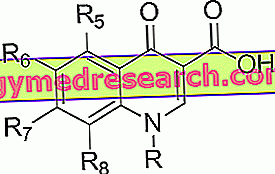Related articles: Food intolerances
Definition
Food intolerance is an adverse reaction of the body to certain foods. Unlike what happens in food allergies, this reaction does not depend on the abnormal activation of the immune system with its antibodies; moreover, it is less severe, occurs gradually and is proportional to the amount of food that is ingested (almost as if the organism is "poisoned"). We can therefore consider a food intolerance as a malaise triggered by the ingestion of particular foods, even of common use, such as wheat, dairy products and eggs.
There are different types of food intolerances. The enzymatic ones are determined by the inability to metabolize certain components of food products. The most common enzymatic intolerance is that of lactose contained in milk; another example of intolerance due to the lack of an enzyme is represented by favism. Intolerances can also occur due to the presence in some foods of substances with pharmacological activity (or that are produced by the intestine starting from the same), such as the vasoactive amines (eg histamine and tyramine), caffeine and ethyl alcohol. Food additives (flavor enhancers, sweeteners, preservatives, etc.) are also often involved.
Probably, there is a predisposition to intolerances transmitted by inheritance, however other factors can also contribute, such as diseases, stress, unbalanced diet and alterations of intestinal bacterial flora.
Most common symptoms and signs *
- Acne
- Anorexia
- Asthenia
- Increased appetite
- Weight gain
- Bubbles on the Tongue
- Burning to the tongue
- Heartburn
- dizziness
- Bad digestion
- Colic
- Abdominal cramps
- Stomach cramps
- Depression
- Diarrhea
- Difficulty concentrating
- Dyspnoea
- Dysentery
- Abdominal distention
- Pain in a hip
- Abdominal pain
- Encopresis
- Flatulence
- Abdominal swelling
- Abdominal gurgling
- Fecal incontinence
- Insomnia
- Thinness
- Stomach ache
- Headache
- Functional Meteorism
- Nausea
- Dry skin
- itch
- Cold
- Acid regurgitation
- Water retention
- Drowsiness
- Constipation
- Inflated stomach
Further indications
Food intolerances can cause various recurrent and persistent disorders, especially at the gastrointestinal, dermatological or respiratory level. Unlike allergies, symptoms do not manifest themselves violently immediately after ingesting food, but can occur over time. With regard to the digestive system, abdominal swelling, flatulence, canker sores, loss of appetite or excessive appetite, nausea, constipation or diarrhea and prolonged or difficult digestion may occur. Furthermore, food intolerances can cause water retention, sudden changes in weight, hyperacidity, gastritis, irritable bowel syndrome or colitis.
Among the respiratory manifestations of food intolerances colds and other recurrent airway infections are detected. From a dermatological point of view, dermatitis, hives, acne and other skin eruptions may occur. In addition, dizziness, headaches, drowsiness, chronic fatigue, anxiety, insomnia and mild forms of depression can occur.
In the case of food intolerances it is necessary to eliminate the foods responsible for the disorder for a few months, under medical supervision, replacing them with others capable of satisfying the organism's nutritional needs. After the abstinence period, you can try to gradually reintroduce these foods into the diet.



